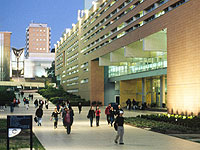Public Health and Corrections - CRIM3022
Faculty: Faculty of Arts and Social Sciences
School: School of Social Sciences
Course Outline: School of Social Sciences
Campus: Sydney
Career: Undergraduate
Units of Credit: 6
EFTSL: 0.12500 (more info)
Indicative Contact Hours per Week: 3
Enrolment Requirements:
Prerequisite: 48 UOC, including 6 UOC at lv1 and 6 UOC at lv2 in Criminology stream. Or 12 UOC lv2 SRAP and 18 UOC lv2 CRIM and enrolled in 3422 or 4763. Or 30 UOC at lv2 including 12 UOC lv2 CRIM and enrolled in 4034. Or 84 UOC and enrolled in 4787
CSS Contribution Charge: 1 (more info)
Tuition Fee: See Tuition Fee Schedule
Further Information: See Class Timetable
View course information for previous years.
Description
Subject Area: Criminology
Prisoners, community-based offenders, and other detainee groups exert huge, social, health and economic impacts on the community and pose significant challenges for society. Those in contact with the criminal justice system endure some of the worst health outcomes of any group in the community in terms of chronic disease, excess mortality, mental illness, neuropsychiatric conditions and exposure to infectious diseases (e.g. HIV and viral hepatitis). Many of these can be attributed to the social determinants of health and lifestyle factors including engagement in health risk behaviours such as drug and alcohol abuse, sexual risk behaviours, body piercing, tattooing and violence. The ‘revolving door prisoner’ ensures that this population is continually mixing with the community and, with most returning to the community after periods in custody, thus posing a threat to the health of the wider community.
Significant overlap exists between public health and criminology (‘epi-criminology’) in terms of offender rehabilitation as the criminogenic needs of this population are also public health priorities that operate in a challenging legal and policy environment that sit alongside human rights imperatives towards offenders. A complete understanding of criminology requires knowledge of offenders in the broader public health context.
In this elective you will learn about the health needs of offender populations from experts working in this field, challenges and controversies in prisoner health (e.g. harm minimisation in prisons); approaches to research with offenders (e.g. quantitative, qualitative, data-linkage, deliberative approaches); health service endeavours in this field; and prevention and intervention strategies. You will undertake real world assignments covering public health issues affecting offender populations.
As Nelson Mandela famously said: “No one truly knows a nation until one has been inside its jails. A nation should not be judged by how it treats its highest citizens but its lowest ones.”









